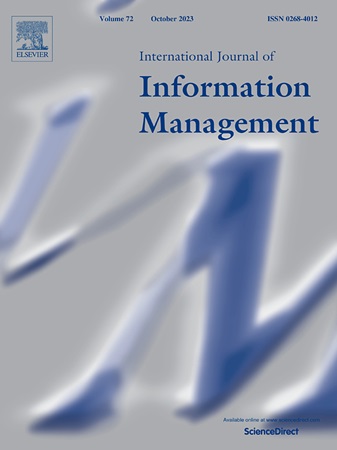From what (motives) to what (outcomes) of relationships with artificially intelligent voice assistants
IF 27
1区 管理学
Q1 INFORMATION SCIENCE & LIBRARY SCIENCE
International Journal of Information Management
Pub Date : 2025-07-23
DOI:10.1016/j.ijinfomgt.2025.102953
引用次数: 0
Abstract
This study holistically examined the interaction between humans and voice assistants (VAs), addressing a wide range of factors that elucidate the motives for their use and the potential relational, behavioral, and functional outcomes. This study conceptualizes parasocial relationship (PSR) as a relational outcome of motives for VA usage. The outcomes of PSR, including continuous usage intention, conversational commerce intention, and word of mouth, were analyzed. Furthermore, this study investigated the moderating effects of the VA voice type and users’ social anxiety. A mixed-method approach was employed across four studies. Study 1 explored VA usage motives through in-depth interviews. In Studies 2 and 3, Partial Least Squares Structural Equation Modeling (PLS-SEM) was used to test the conceptual model and the moderating role of social anxiety. Study 4 used an experimental approach to examine the moderating influence of VA voice type (synthetic vs. human). Study 1 identified six motives for using VAs: entertainment, information seeking, life efficiency, social interaction, personal identity, and virtual interaction for escaping from reality (VIER). Study 2 revealed that social interaction, VIER, and life efficiency motives promote PSR with VAs, leading to conversational commerce intention, continuance usage intention, and positive word-of-mouth. Study 3 demonstrated that social anxiety amplifies the impact of the social interaction motive on PSR with VAs. Study 4 found that individuals with social interaction and VIER motives are more likely to develop parasocial connections with VAs featuring human voices rather than synthetic ones. This study offers industry practitioners and marketers significant insights to enhance users’ PSR by addressing their motives to achieve desired behavioral outcomes.
从与人工智能语音助手的关系(动机)到(结果)
本研究全面考察了人类与语音助手(VAs)之间的互动,解决了阐明其使用动机和潜在关系、行为和功能结果的各种因素。本研究将副社会关系(PSR)概念化为VA使用动机的相关结果。我们分析了PSR的结果,包括持续使用意愿、会话商务意愿和口碑。此外,本研究还探讨了语音类型对用户社交焦虑的调节作用。四项研究采用混合方法。研究1通过深度访谈探讨VA使用动机。研究2和研究3采用偏最小二乘结构方程模型(PLS-SEM)检验社交焦虑的概念模型和调节作用。研究4采用实验方法检验了VA语音类型(合成与真人)的调节作用。研究1确定了使用虚拟现实的六个动机:娱乐、信息寻求、生活效率、社会互动、个人身份和逃避现实的虚拟互动(VIER)。研究2显示,社会互动动机、VIER动机和生活效率动机促进PSR与VAs,导致会话商业意愿、持续使用意愿和正面口碑。研究3表明,社交焦虑放大了社会互动动机对VAs患者PSR的影响。研究4发现,有社会互动和VIER动机的个体更有可能与人声而不是合成声音的人工智能发展出准社会联系。这项研究为行业从业者和营销人员提供了重要的见解,通过解决用户的动机来实现预期的行为结果,从而提高用户的PSR。
本文章由计算机程序翻译,如有差异,请以英文原文为准。
求助全文
约1分钟内获得全文
求助全文
来源期刊

International Journal of Information Management
INFORMATION SCIENCE & LIBRARY SCIENCE-
CiteScore
53.10
自引率
6.20%
发文量
111
审稿时长
24 days
期刊介绍:
The International Journal of Information Management (IJIM) is a distinguished, international, and peer-reviewed journal dedicated to providing its readers with top-notch analysis and discussions within the evolving field of information management. Key features of the journal include:
Comprehensive Coverage:
IJIM keeps readers informed with major papers, reports, and reviews.
Topical Relevance:
The journal remains current and relevant through Viewpoint articles and regular features like Research Notes, Case Studies, and a Reviews section, ensuring readers are updated on contemporary issues.
Focus on Quality:
IJIM prioritizes high-quality papers that address contemporary issues in information management.
 求助内容:
求助内容: 应助结果提醒方式:
应助结果提醒方式:


